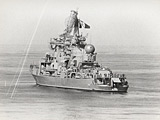Black Sea Fleet Deal Stirs Kiev Storm
By Simon Saradzhyan for ISN
The package of agreements, which Ukrainian President Viktor Yanukovich and his Russian counterpart Dmitry Medvedev signed in the eastern Ukrainian city of Kharkov on 21 April, extends the Black Sea Fleet’s lease for 25 years after it expires in 2017 with a five-year prolongation option. In exchange, Ukraine will get discounts on Russian gas as well as collect more rent from the fleet’s Crimean facilities, for which Moscow is now paying $98 million annually.
The discounts will expire in 2020 while the fleet will stay in the Crimea at least until 2042 if the agreement is ratified. The agreements will allow Ukraine to save up to $40 billion, according to Yanukovich. According to Yanukovich’s arch-enemy, former prime minister Yulia Tymoshenko, however, Ukraine won't be saving any money at all on Russian gas.
Tymoshenko and Yanukovich's pro-western predecessor Viktor Yushchenko have already vowed to try to derail ratification of the lease, on which the Ukrainian parliament is set to vote on 27 April, and have even threatened to impeach the president for betrayal of national interests and violation of the Ukrainian Constitution. The constitution declares Ukraine a neutral state and bans foreign military bases, but it also contains a clause that allows for the maintenance of those bases that have already been established, according to government lawyers.
The 21 April agreements, which Russian Prime Minister Vladimir Putin had secretly negotiated with his Ukrainian counterpart Nikolai Azarov, are strong evidence of the new Ukrainian leadership’s intention to re-balance the country’s position vis-à-vis the West and the East.
In fact, Yanukovich's actions echo the shrewd slow-paced strategy pursued by his mentor and 2nd Ukrainian president Leonid Kuchma, who sought to balance Ukraine between Russia and the West, refraining from explicit overtures to NATO in order to avoid antagonizing Russia while exploring possibilities of EU membership.
“Our strategic aims are not changing. Ukraine will integrate into the European Union,” Agence France Presse quoted external pageYanukovich as sayingcall_made on 22 April. “My aim is that in the triangle of EU-Russia-US, Ukraine will find its place and its national interests. We have to find equilibrium.”
While keeping closer ties with, if not membership in the EU among the list of foreign policy priorities, Yanukovich has all but quashed the country’s prospects of joining NATO. These prospects had been nourished by Yushchenko despite strong public opposition, especially in the Crimea and eastern Ukraine. Yanukovich campaigned on a promise to end the NATO bid and he disbanded the government commissions focused on advancing this bid soon after his inauguration.
As such, even though NATO Secretary-General Anders Fogh Rasmussen stated on 21 April that the Black Sea Fleet agreement did not shut the door on the Ukraine’s NATO membership, it is unlikely that Ukraine will seek such membership or that NATO will grant it as long as Yanukovich remains president and the Russian fleet remains in the Crimea. Moreover, whoever succeeds Yanukovich in 2015 or 2020 will probably find it expedient to honor the deal in order to avoid destabilization, which could occur as a result of the strong pro-Russian sentiments in the Crimea and eastern Ukraine, as well as Russia’s capacity to act as a spoiler.
Since becoming president, Yanukovich has taken a number of steps to mend fences with Russia after relations between the two neighbors hit rock bottom in the last year of Yushchenko’s presidency.
The first of these steps was his decision to invite Russian Orthodox Patriarch Kirill to bless his inauguration in February.
Yanukovich also fired Admiral Igor Tenyukh - who reportedly opposed the presence of the Russian fleet in Crimea - from his post as commander of the Ukrainian Navy. Yanukovich then gave this post to Vice-Admiral Viktor Maksimov, who is currently planning the first Ukrainian-Russian naval exercise in several years.
More importantly, Yanukovich gave a number of key posts in the government to figures generally believed to favor significant improvement of relations with Russia, including Azarov. Soon after his appointment as prime minister, the native Russian proposed that Kiev and Moscow discuss Russia’s participation in the modernization of Ukraine’s gas-pipeline system - something the previous Ukrainian government had staunchly refused.
While poised to pursue deeper economic cooperation with Moscow, Yanukovich will probably find it expedient to avoid participation in such integration projects led by Moscow as the external pageCollective Security Treaty Organizationcall_made (CSTO). At least one of Yanukovich's campaign promises was to keep Ukraine not only out of NATO, but also out of the CSTO.
Membership in the CSTO would end Kiev's delicate balancing act between the East and the West, from which Ukraine benefits in the absence of clear EU membership prospects. A military alliance with Russia will also antagonize many in central and western Ukraine in the same way that Yushchenko’s drive for NATO antagonized those in the Crimea and eastern Ukraine.
A new pan-European security system, in which Ukraine, Russia and other non-NATO members are given a firm institutionalized say in decision-making on conflict prevention and resolution, use of force and other issues of European security could prove to be the middle path for Yanukovich and Ukraine as a whole.

